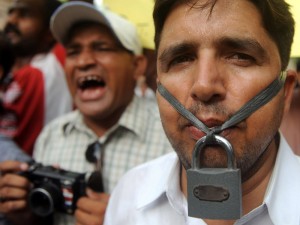
Pakistani journalists stage a demonstration during a protest in Karachi on June 3, 2011, against the killing of Pakistani journalist Saleem Shahzad. RIZWAN TABASSUM/AFP/Getty Images
A year after the abduction and murder of Pakistani investigative journalist Saleem Shahzad, little has been done to investigate the powerful Inter-Services Intelligence (ISI) and their possible involvement in the murder. Meanwhile another journalist, Murtaza Razvi, was killed in April 2012, and numerous other journalists in Pakistan have reported death threats.
The death threats continue.
A government inquiry into Shahzad’s murder said it was unable to identify his killers. It speculated that any of a number of state, non-state or foreign actors, including al-Qaeda or the Taliban, could have been responsible.
True, but why no mention of the ISI? SEE THE REST OF THIS POST
